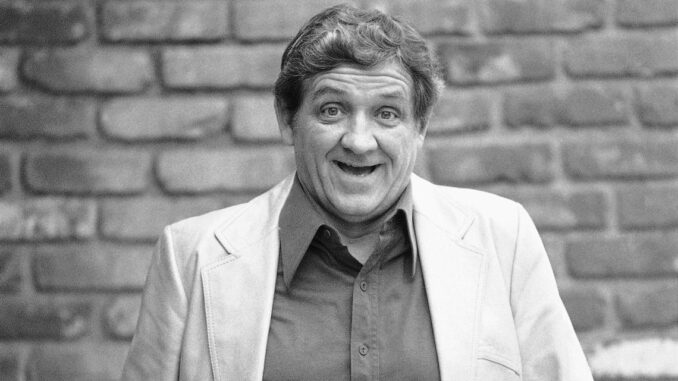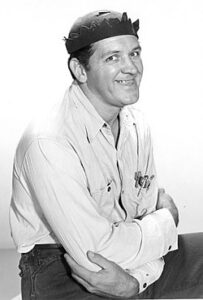
Introduction: A Beloved Mayberry Star, A Shocking Reaction
George Lindsey, the actor who brought the lovable, goofy Goober Pyle to life on The Andy Griffith Show, wasn’t always all smiles behind the scenes. While fans remember him for his thick accent, beanie hat, and endearing cluelessness, Lindsey had real feelings—and one episode of the show pushed him far past his limit.
You wouldn’t expect a lighthearted sitcom to provoke such a fierce response from one of its stars, right? But that’s exactly what happened when George Lindsey watched a particular episode and flew into a rage. His words? “I just went completely nuts.” So what went so wrong in Mayberry to set off the man behind Goober?
Let’s dive deep into the backstory, unravel the real reason behind Lindsey’s outburst, and explore how it changed his view of the show forever.
Who Was George Lindsey Before Goober?
Before stepping into the Mayberry spotlight, George Lindsey was just another Southern boy with dreams of the big screen. Raised in Alabama, Lindsey had a knack for storytelling, a warm drawl, and a love for acting that led him to Hollywood. After various small roles, he struck gold with Goober Pyle—Gomer’s cousin—who quickly became a fan-favorite character.
Goober was silly, sweet, and full of heart. But behind that aw-shucks grin, Lindsey was a serious actor who took pride in his work—and wanted respect for his craft.
The Birth of Goober Pyle on ‘The Andy Griffith Show’
When Gomer Pyle (played by Jim Nabors) left Mayberry to join the Marines in his spin-off Gomer Pyle, U.S.M.C., Lindsey was tapped to fill the comedic void. Thus, Goober was born—a dim-witted mechanic with a heart of gold and zero filter.
Goober quickly became a staple, bringing laughs with every awkward interaction and bungled line of dialogue. But there’s a fine line between playing a fool and being made to feel like one—and Lindsey began to feel the difference.
The Episode That Made George Lindsey Explode
The episode that set George Lindsey off was “Goober Makes History”, which aired in 1968. The storyline followed Goober attempting to join a local intellectual club, trying to better himself. Instead of a growth arc, the episode painted Goober as a hopeless idiot, unable to grasp even the simplest ideas.
Lindsey’s response? Fury.
“I Just Went Completely Nuts” – What Triggered Him?
In his autobiography, Goober in a Nutshell, Lindsey didn’t hold back. He recalled sitting down to watch the episode, expecting a mix of humor and dignity. What he saw instead was a caricature—a man being laughed at, not laughed with.
“I was embarrassed,” he wrote. “They made Goober look like the dumbest human being alive. I just went completely nuts. I couldn’t believe what they had done to me.”
Was It Just About Ego? Or Something Deeper?
It’s easy to think it was just an actor upset about his portrayal, but Lindsey’s anger had deeper roots. He cared about Goober. He saw him not as a joke, but as a symbol of Southern warmth and humility.
To Lindsey, the episode crossed a line. It mocked Goober’s attempt to improve himself—and that felt personal. The actor saw it as a slight against people like him and his family back in Alabama: folks who may not be book-smart but have plenty of wisdom and heart.

The Difference Between Comedy and Mockery
Comedy thrives on exaggeration—but there’s a difference between making fun of a situation and making fun of someone. In this episode, Goober wasn’t in on the joke—he was the joke.
Lindsey wasn’t against being funny, but he wanted Goober to be loveable and believable. When the character became too absurd, it turned from comedy into ridicule. And Lindsey, ever protective of his creation, couldn’t take it.
How George Lindsey Fought Back
After the episode aired, Lindsey made his feelings clear to the show’s producers. He didn’t want Goober to become a cartoon. He asked for scripts that respected the character’s humanity.
While he didn’t have the same pull as Andy Griffith or Don Knotts, Lindsey’s voice was heard. The writers began crafting Goober-centric episodes with more heart and depth—even if the character remained comically clueless.
Did This Hurt His Relationship With the Cast?
Surprisingly, Lindsey’s frustration didn’t fracture his relationships with the cast. Andy Griffith understood the struggle, and the two remained friends until Griffith’s passing.
Behind the scenes, Lindsey was known as kind, funny, and committed. While his outburst was intense, it stemmed from passion, not ego. Most of the cast respected that.
Audience Reactions – Did Viewers Notice the Difference?
Fans of The Andy Griffith Show may not have recognized the episode’s shift in tone immediately. But longtime viewers often say Goober’s portrayal felt more exaggerated in later seasons. What was once cute and quirky began to border on slapstick.
And when Lindsey’s autobiography came out, fans finally understood the emotional toll it took on him.
Lindsey’s Later Career and Legacy
After The Andy Griffith Show and Mayberry R.F.D., Lindsey went on to act in various TV shows, including a long-running role on Hee Haw. He embraced his Southern roots but always kept one eye on how he was being portrayed.
Goober was more than just a role—it was a responsibility. And Lindsey spent his life protecting that legacy.
What This Teaches Us About Representation in Comedy
This story offers a valuable lesson about how we portray people—especially those from marginalized or misunderstood communities. It reminds us that comedy shouldn’t punch down. Even in a fictional town like Mayberry, characters deserve dignity.
Why George Lindsey Still Matters Today
In an era of reboots and nostalgic TV, the lessons George Lindsey tried to teach are more relevant than ever. He wasn’t just a goofy sidekick. He was a man who believed in respect—for himself, his roots, and his audience.
And sometimes, standing up for what’s right means going “completely nuts.”
Conclusion: Behind the Laughs, A Man With Integrity
George Lindsey’s outburst over “Goober Makes History” wasn’t just about one bad script. It was about a man who cared deeply about how he—and people like him—were represented on screen. His emotional reaction came from a place of love: love for his character, his background, and the millions of fans who saw themselves in Goober.
In the end, his frustration helped shape a better, more respectful version of Mayberry. And for that, we owe him more than just laughs—we owe him thanks.
FAQs
Q1: What episode made George Lindsey so upset?
A1: The episode “Goober Makes History” upset Lindsey because it portrayed Goober as unintelligent in a way that felt mean-spirited and demeaning.
Q2: Did George Lindsey ever quit the show after the episode?
A2: No, although he was furious, Lindsey didn’t quit. He voiced his concerns and continued to play Goober while advocating for better writing.
Q3: How did the rest of the cast react to Lindsey’s anger?
A3: Most of the cast, including Andy Griffith, understood his frustration. It didn’t damage their friendships.
Q4: Was Goober based on anyone from Lindsey’s real life?
A4: Yes, Lindsey based Goober on people he grew up with in Alabama—everyday folks with big hearts and simple wisdom.
Q5: How did George Lindsey want Goober to be remembered?
A5: Lindsey wanted Goober to be seen as lovable, kind-hearted, and more than just comic relief—someone who reflected real people, not just a punchline.
Let me know if you’d like to expand this into a printable feature, include quotes from his autobiography, or add image captions for a visual article format